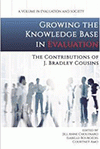
Growing the Knowledge Base in Evaluation
The Contributions of J. Bradley Cousins
Edited by:
Jill Anne Chouinard, University of North Carolina at Greensboro
Isabelle Bourgeois, Ecole Nationale D’administration Publique, Canada
Courtney Amo, Independent Scholar
A volume in the series: Evaluation and Society. Editor(s): Stewart I. Donaldson, Claremont Graduate University. Katrina L. Bledsoe, Education Development Center.
Published 2019
Evaluation use was identified by Henry and Mark (2003) as being the single most studied area in the field of evaluation. They refer with a sense of nostalgia to the ‘golden age’ of research on use perhaps almost implying that it came and went. Professor J. Bradley Cousins has had a longstanding and continuing commitment to advancing theory and practice regarding use through empirical research on evaluation, and through the professional development of students and practitioners within North America and internationally. The important influence and impact of the contributions of Cousins and associates is the focus of this edited book.
This book brings together a distinguished, international group of authors, to reflect on the areas of contribution of Professor Cousins, and situate his work within contemporary areas of evaluation research and practice. Each chapter describes how the study and practice of evaluation has weaved its way through our understanding of organizational learning, participatory evaluation, and evaluation capacity building. The book concludes with a reflection by Professor Cousins himself on what these insights mean for the field of evaluation, and what future areas of research and contribution can be planned for and anticipated.
CONTENTS
Introduction, Jill Anne Chouinard and Courtney Amo. On the Contributions of J. Bradley Cousins to Educational Administration and Their Influences on His Work in Program Evaluation, Peter Milley and Jill Anne Chouinard. Counting the Ways That Brad Cousins Shaped My Thinking About Evaluation, Jean A. King. Evaluation Theory Contributions of J. Bradley Cousins: Focus on Process Use, Michael Quinn Patton. The Many Facets Of Evaluation Capacity: Conceptual, Methodological, and Practical, Isabelle Bourgeois, Catherine Elliott, Swee Goh, and Robert E. Lahey. An Exploration of the Values Underpinning the Theory and Practice of Collaborative Approaches to Evaluation, Nathalie Gilbert, Hind Al Hudib, and Elizabeth Whitmore. Stakeholders Weigh in on Collaborative Approaches to Evaluation, Lyn M. Shulha, Michelle Searle, Cheryl N. Poth, and Agnieszka Chalas. Evaluation and Knowledge Mobilization: Advancing Integrated Knowledge Translation Through the Work of J. Bradley Cousins, Barbara Szijarto, Kate Svensson, and Peter Milley. Brad Cousins as a Brad: The Skillful Integration of Research on Evaluation, Evaluation Use, Conceptual Models, and Participatory Evaluation, Melvin M. Mark. Moving Forward, Look Back, Courtney Amo, Jill Anne Chouinard, Isabelle Bourgeois, and John Burrett. The Nature and Implications of an Evaluation Research Program, J. Bradley Cousins. About the Authors.
-
Paperback9781641137690
Web price: $45.04 (Reg. 52.99)
-
Hardcover9781641137706
Web price: $80.74 (Reg. 94.99)
- eBook9781641137713

- EDU011000 - EDUCATION: Evaluation & Assessment
- EDU037000 - EDUCATION: Research
- EDU046000 - EDUCATION: Professional Development
-
 Democratic Evaluation and Democracy
Exploring the Reality
Democratic Evaluation and Democracy
Exploring the Reality
-
 Disrupting Program Evaluation and Mixed Methods Research for a More Just Society
The Contributions of Jennifer C. Greene
Disrupting Program Evaluation and Mixed Methods Research for a More Just Society
The Contributions of Jennifer C. Greene
-
 Evaluation for a Caring Society
Evaluation for a Caring Society
-
 Outcome Harvesting
Principles, Steps, and Evaluation Applications
Outcome Harvesting
Principles, Steps, and Evaluation Applications
-
 Practical Wisdom for an Ethical Evaluation Practice
Practical Wisdom for an Ethical Evaluation Practice
-
 System Evaluation Theory
A Blueprint for Practitioners Evaluating Complex Interventions Operating and Functioning as Systems
System Evaluation Theory
A Blueprint for Practitioners Evaluating Complex Interventions Operating and Functioning as Systems
-
 Visionary Evaluation for a Sustainable, Equitable Future
Visionary Evaluation for a Sustainable, Equitable Future

